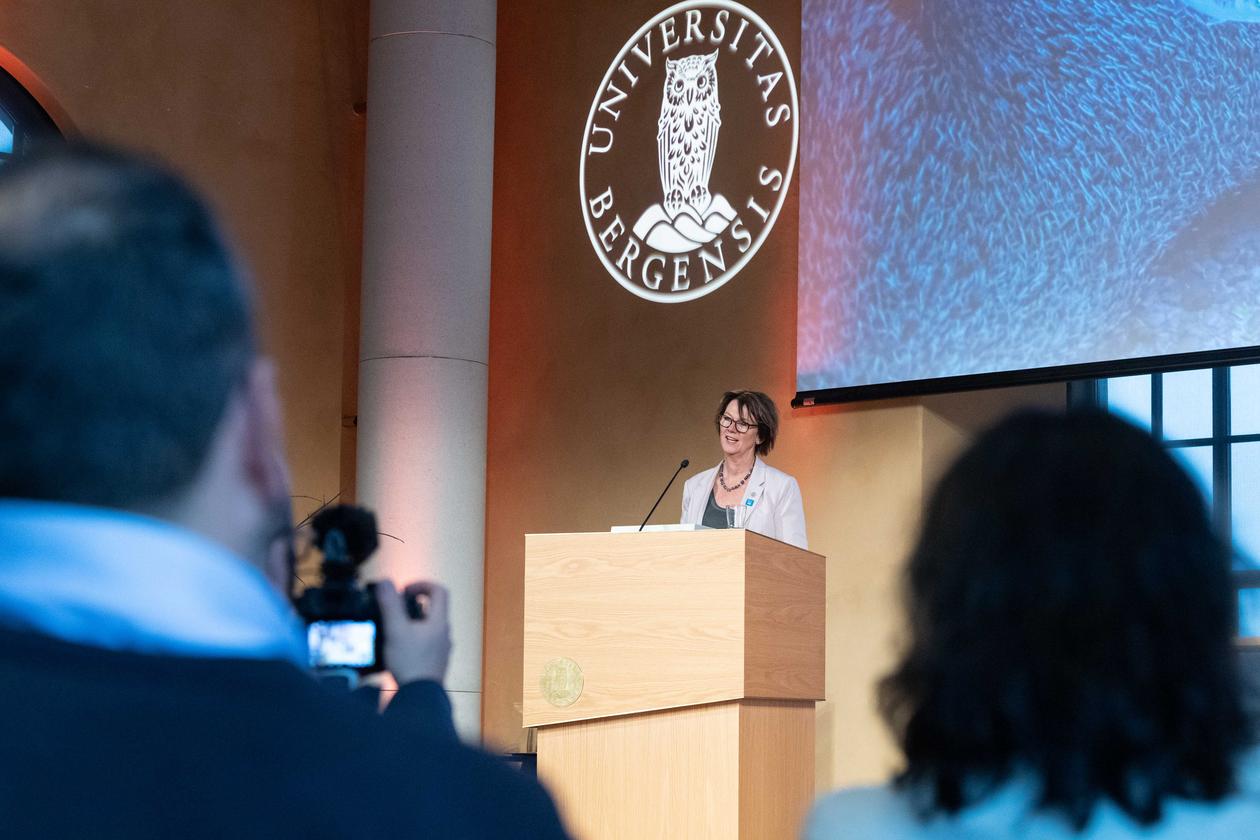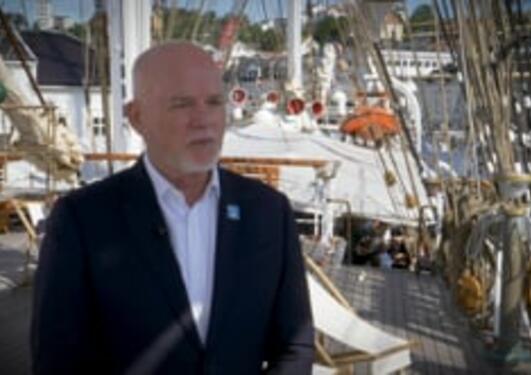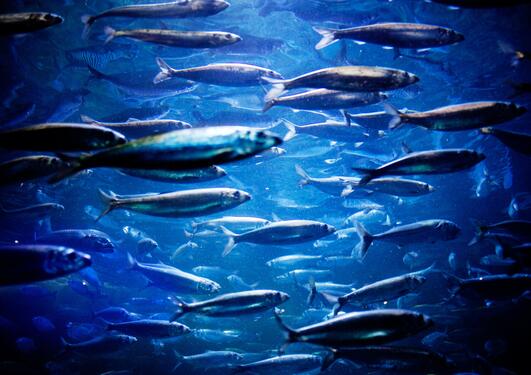Making tough decisions for the ocean
“A new deal for nature is on everyone's lips,” said Ambassador Peter Thomson in his public lecture after becoming an honorary doctor at the University of Bergen.

Main content
Ambassador Peter Thomson started and ended his public lecture with reading from the poem The Sea by the Nobel Literature Prize laureate Pablo Neruda before reflecting on his personal relation to the ocean from childhood on and moving into the challenges the world faces, in particular from climate change.
Visionary leadership
He was introduced by Professor Lise Øvreås, the director of Ocean Sustainability Bergen (OSB), part of the University of Bergen's strategic initiative SDG Bergen.
“Ambassador Thomson showed visionary leadership in guiding the preparations for the first UN Ocean Conference in June 2017. He is also a strong advocate in promoting the universities in work on the SDGs and global diplomacy,“ said Øvreås when introducing Thomson. She also pointed to the University of Bergen's leadership on ocean science.
“We are grateful to have been chosen as lead institution for SDG14 by the International Association of Universities (IAU). We were selected to lead this based on our research quality and engagement with the SDGs. The university is also the SDG14 Hub for United Nations Academic Impact (UNAI). Through Ocean Sustainability Bergen we focus on ocean science and diplomacy, working with partner institutions worldwide,” said Øvreås before leaving the stage for Ambassador Thomson.
Sustainable blue economy
“To chart our course for the reversal of the decline in the Ocean’s health, we have universally adopted Sustainable Development Goal 14 – SDG14, requiring us to conserve and sustainably use the Ocean’s resources. Supported by the UN Ocean Conferences, SDG14 stands like a guiding beacon, its ten targets in harmony with the other sixteen SDGs working to bring an end to poverty, hunger and environmental degradation on this best of all planets,” said Thomson.
“Emerging from SDG14’s demand for sustainable use of the Ocean’s resources, is the growing recognition of the Sustainable Blue Economy’s central role in the future of humanity’s food, energy and security. Many now regard the Sustainable Blue Economy as the lens through which we must view the future; without which we will but venture from degraded terrestrial landscapes out into the Ocean to prosecute yet another round of pillage upon limited planetary resources.”
He then elaborated on the concept of the Sustainable Blue Economy.
“A Sustainable Blue Economy envisages endless protein and food supplies emerging from innovative forms of aquaculture and Ocean-farming, based on sustainable feedstocks, appropriate farmed species, and multitrophic techniques. It envisages taking aquaculture inland to places like the continent of Africa where it can make such a profound difference to sustainable development efforts.”
Promoting a decade of ocean science
He pointed to the upcoming UN decade of ocean science and the need to make tough evidence-based decisions for future generations.
“The UN Decade of Ocean Science for Sustainable Development will be critical to us amassing the science we will need to make the tough evidence-based decisions that will be confronting us around the year 2030. The Decade gets underway in 2021 and we’ll give it a super-boost in Lisbon in June next year at the UN Ocean Conference, where the central theme will be Scaling up Ocean Action through Science and Innovation,” said Ambassador Thomson.
The role of youth
Along with other ocean enthusiasts, Thomson is already deep into the planning of the 2020 UN Ocean Conference, in particular looking at the role young people will play in preserving the ocean for future generations.
“A fortnight ago I was in Fiji, addressing remarks to young Pacific Islanders. My advice to them was to think about Ocean Science as a burgeoning field of endeavour in which to get involved, no longer exotically esoteric as it seemed in my youth, but now central to understanding and meeting of the great challenges ahead for humanity. I pointed out that it isn’t rocket science, it’s Ocean Science; in other words, it’s a field that’s far more important to humanity’s survival than rocket science and sending men to Mars.”
Getting everyone on board
He pointed to the numerous challenge, not the least getting everyone involved – in particular those who see no direct connection between their daily lived and the ocean.
“If you live in the urban citadels of post-industrial societies, you may ask, but does all this matter to me? All I suggest here is that we contemplate the fact that every second breath we take comes from the Ocean. The Ocean is the source of life on this planet and we are all intimately linked with the fate of phytoplankton, seagrasses, kelp, coral, mangroves, the wetlands and the rivers that flow into our coastal ecosystems,” said Ambassador Thomson.
“In fact, we cannot enjoy a healthy planetary ecosystem without there being a healthy Ocean. How perplexing then, that at times it seems humanity is doing its best to destroy the Ocean’s well-being. This has to stop.”
From linear to circular
He expressed a need for a new way of thinking around economics and growth.
“The precarious position in which we find ourselves demands that we radically transform our patterns of consumption and production,” said Thomson asking us to prioritise need over greed.
“Emerging choices abound; solutions are blooming amongst the young, and in the enlightened rethinking of development and investment to shape them into circular rather than linear models. Change is, as ever, afoot.”
He found encouragement in his travels as the UN Secretary General's Special Envoy the Ocean.
“From where I work around the world, pushing for achievement of the targets of SDG14, in meetings with concerned parties in a different country pretty much every week for the last two years, the news is encouraging. Along with deep concern at what Science is revealing and the worrisome trending of Climate and Ocean Change, I find that everywhere I go, hope in and fidelity to the plan are strong,” said Ambassador Thomson.
A new deal for nature
He has found support for a sustainable ocean economy across sectors, borders, etc.
“And the business sector is responding too, partly it is true through fear of being kodaked by consumer demand, but also because the people within it understand we have inescapable moral obligations to future generations of humans and our fellow creatures. A new deal for Nature is on everyone’s lips,” said Ambassador Thomson, before ending on a cautiously positive note.
“Individuals, communities, and governments, even the hardest of hearts, are being swayed to acceptance that sustainability has become the over-riding principle for decision-making. Stay true to our global plan, to the Paris Climate Agreement and the Sustainable Development Goals, and together we will prevail; together we will build for the generations to come, the secure and prosperous future we most surely want for them.”


